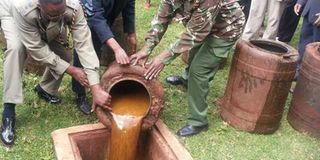Starving siblings pay for the sins of their jailed mother

Police pour illicit brew. Two siblings are on the verge of starving in Kamira Village, Murang’a County after their mother was jailed for selling illicit brew. FILE PHOTO | NATION MEDIA GROUP
What you need to know:
- The two brothers are hungry and clad in torn clothes. They have not bathed for days.
- Here, parents’ feelings do not exist in a vacuum.
Two siblings are on the verge of starving in Kamira Village, Murang’a County.
Although the local people acknowledge their plight, no one is willing to help 16-year-old Peter or his six-year-old brother.
Their mother was jailed for brewing alcohol and the neighbours are yet to forgive her for what she did to their sons.
The younger boy yawns and asks politely whether the Nation team could buy him bread at the local shop. “I am very hungry,” he says.
In their rusty corrugated iron sheet house, Peter says that he has a 19-year-old brother who has not returned home for a while. It’s now his duty to look after his younger sibling.
The house is dirty with clothes and unwashed utensils scattered on the floor.
The two brothers are hungry and clad in torn clothes. They have not bathed for days.
Peter had gone to help another villager bake mandazi hoping he would be paid or given food to eat.
“I am waiting for him to sell what we made and then he will give me what remains at the end of the day,” he says.
NO PITY FOR CHILDREN
The village elder and head of community policing, Lawrence Gathimbi, tells Nation: “It is hard for people to feel pity for them because women came to beg their mother to stop brewing the alcohol but she continued with such audacity it broke everybody’s hearts.”
Barely a stone’s throw away from their house is their paternal aunt’s home.
During the interview, a neighbour passes by with a load of firewood.
She is reluctant to talk to the Nation team at first. When she finally agrees 20 minutes later, she reiterates what the village elder and a few other locals had said about the children.
When the crackdown against illegal brews was at its peak, she says, the boys’ mother — who is only known to the locals as Wamaina — devised new ways to supply her customers with her illicit alcohol.
“She had been given several warnings but she paid no heed,” the neighbour said.
Wamaina would run her business for one hour — from 7am to 8am.
A law enforcement officer said: “She would hire young men to transport the alcohol, and it was not surprising that the young men would later join in the drinking.
“Every time she was arrested she would use the children to plead for leniency until the villagers felt they had had enough.”
In the end, she was jailed.
“The government cannot fail to protect other citizens by allowing you to break the laws all the time because you have children,” the officer said.
Stories such as Peter’s and his little brother are not uncommon in this area that spans Gikandu location, Iyego and Nyakahora village.
Here, parents’ feelings do not exist in a vacuum.
They are oscillating between mourning for their sons and daughters whose lives have been wasted by illicit alcohol and the anger directed at brewers.
Ms Jane Mwangi, the chairperson of a women’s group in Kigumo told Nation: “People have died, others blinded.
“It is all just statistics and stories until you know someone close whose life has been messed up by alcohol.”





